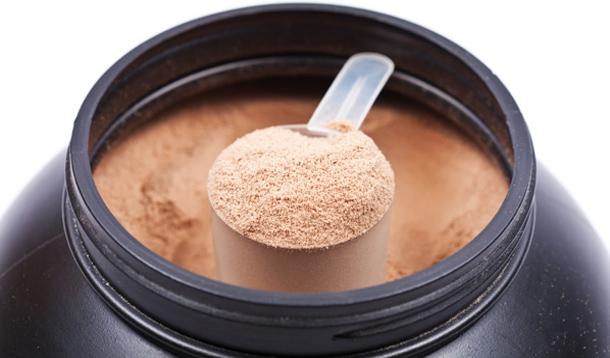
Have you ever wondered if protein powder is the secret to your workout success? Do you have an old tub of protein powder in the back of the pantry from your pre-baby gym days? Well, first, check the expiry date. Then read this.
This morning I was at my client S's home for our usual weekly session. S is an enthusiastic client and we've been working together for about 5 years. S's current challenge is menopause. She watches her diet, but lately, a few pounds have slowly crept on. It seems her normal diet and exercise routine is in for a bit of tweaking. So we spent some time after our workout examining her food journals. One of the things I discovered is that she's begun consuming a protein powder shake after every morning workout. She has a protein shake after exercising, then her breakfast a little later.
Seems like a good day to discuss the topic of protein shakes!
Here's what I suggested to S. If you are going to use a protein powder to increase your total daily protein consumption:
Based on our chat, S is going to start combining her protein powder and her breakfast into one protein-packed post-workout meal. The two options we came up with for S:
Now... the real question is... do you need protein powder?
Not really. It can be a fine way to increase protein consumption if you're always on the run, need or want to gain muscle, or really into eating powdered things. Are you training to be an astronaut, by the way?
I do not use protein powder and never have. I do not have any trouble building muscle without using protein supplements. I consume plenty of protein and eat meat and/or meat substitutes (egg, dairy, soy, etc.) at least twice per day (and sometimes for snacks as well, but those are more likely to be dairy than meat). I do not recommend to my clients that they use protein powder. S came up with this idea on her own and I am merely supporting her in fitting this into her daily diet without blowing her calorie budget or losing out on other, more natural and nutritious foods. Just to remind everyone, I'm a personal trainer and not a dietitian. I don't prescribe diets.
There are some conflicting opinions on just how much protein the humany body needs for optimal health and fitness.
According to the U.S. Centres for Disease Control & Prevention, 10-35% of your daily calories should come from protein. The CDC states men need an average of 56 g protein per day and women, just 49 g per day. This works out to about 0.8 g protein for every kg body weight. Note: this is for every kg, not every lb. If you are training for an endurance event (marathon, etc.), you might increase that daily allowance to 1.0-1.2 g protein/kg to help maintain muscle mass.
Bodybuilders and low-carb dieters tend to consume more in the realm of 1.5-2.0 (or more) g protein per kg body weight per day. This is, in my humble opinion, too much protein. Excess protein is hard for the kidneys to process and can lead to dehydration (which often gives you that first bit of weight loss when you start a high-protein diet). In addition, protein, like carbohydrates and fat, will be converted to body fat if consumed in excess. Save those calories for more vegetables, whole grains, dairy and fruits, and stick with the fairly universal 0.8 g/kg recommended daily allowance.
When you can, consume your protein from food sources (the less animal, the better for your heart and arteries). If you like the ease of protein powder, follow my guidelines and try not to consume it more than 1-2x/day, and never use protein powder as a meal replacement.
But one last thought. Might I suggest my favourite protein "supplement": cottage cheese! Just 1/2 cup of cottage cheese (fat free, 1% or 2% - your choice) has 15 g protein and around only 100 calories. Add cinnamon or some sliced banana if you like a sweeter snack or - as I do - chop up a green onion and add fresh ground pepper for a savoury snack.
Yum!